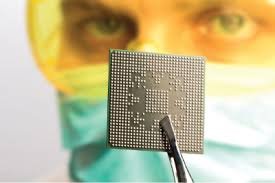Ultra-sensitive nano-chip for early cancer detection
May 23, 2014 | Friday | News | By BioSpectrum Bureau
Ultra-sensitive nano-chip for early cancer detection
Nanotechnology aiding in cancer detection
An international team of researchers led by a ICREA Professor at ICFO Romain Quidant, has successfully developed "lab-on-a-chip" platform capable of detecting protein cancer markers in the blood using the very latest advances in plasmonics, nano-fabrication, microfluids and surface chemistry.
This cancer-tracking nano-device shows great promise as a tool for future cancer treatments, not only because of its reliability, sensitivity and potential low cost fact, but also because of its easy carry-on portable properties, which is foreseen to facilitate effective diagnosis and suitable treatment procedures in remote places with difficult access to hospitals or medical clinics.
Although very compact (only a few centimeter square), the lab-on-a-chip hosts various sensing sites distributed across a network of fluidic micro-channels that enables it to conduct multiple analyses. Gold nano-particles lie on the surface of the chip and are chemically programed with an antibody receptor in such a way that they are capable of specifically attracting the protein markers circulating in the blood. When a drop of blood is injected into the chip, it circulates through the micro-channels and if cancer markers are present in the blood, they will stick to the nano-particles located on the micro-channels as they pass by, setting off changes in what is known as the "plasmonic resonance".
These results are the outcome of the SPEDOC (Surface Plasmon Early Detection of Circulating Heat Shock Proteins and Tumor Cells) FP7 project of the European Commission, coordinated by Prof. Quidant. The project also received generous philanthropic support from Cellex Foundation Barcelona.









